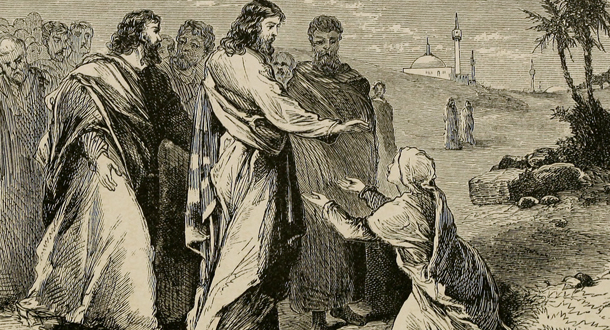
Scripture:
Wisdom 1:13-15; 2:23-24
2 Corinthians 8:7, 9, 13-15
Mark 5:21-43
Reflection:
In our Gospel reading for Sunday (Mark 5:21-43), we have two examples of great faith. The first person we encounter is Jairus, a synagogue official. Jairus comes to Jesus, pleading Him to lay hands on his daughter, who is “at the point of death.” As a synagogue official, I wonder if Jairus was instructed by many Pharisees and scribes to denounce, or at least discourage others from listening to Jesus. But here he is, desperate about his daughter, willing to trust that Jesus has the power to heal her.
Then, when Jesus takes the time to attend to the woman suffering from hemorrhages, Jairus still has faith, even though he might well have given into impatience and anger about the interruption, and given up. And when they arrive at Jairus’ home, and find out that his daughter has died, he might have given up then. But he still has faith that Jesus can do something for her.
Then there is the aforementioned woman. She has been suffering from hemorrhages for a long time. She has tried everything she can think of, but nothing has worked. She decides to go to Jesus. But unlike Jairus, she does not go directly to plead with Jesus. But she believes that he has the power to heal her, and she believes that even if she just touches His clothes, she will be healed.
We have two different people, with two different situations, with two different approaches. But their answer to their situations is the same: to go to Jesus.
Is Jesus the answer for us? Do we trust that Jesus has the power to heal? I think that some people may have the faith that Jesus can heal, but have a hard time believing that Jesus is willing to heal them. So, it’s not only having the faith in Jesus’ power, but having the faith in Jesus’ love, that is the issue. And when it seems that God is moving too slowly to answer our prayers, we may be tempted to think God has stopped loving us. But look at the Cross, and know God’s love in Jesus Christ for you and for me and for the whole world!
In our divided world, the greatest challenge may be to believe not only in God’s love for us, but in God’s love for “them.” When I was looking at the Scripture readings for Sunday, I could not let go of one of the verses in our first reading from Wisdom (1:13-15, 2:23-24): “God did not make death, nor does he rejoice in the destruction of the living.” If God does not rejoice in the destruction of life, why do we find ourselves at times rejoicing in the destruction or downfall of those we consider “other;” those we consider “enemies? Maybe the more challenging question is to ask why it can be so easy for us to be complacent in the midst of destruction of life caused by poverty or oppression or the damage done to our environment? The ills afflicting our world can be overwhelming, but by the grace of God and empowered by God’s love, we can do what we can, where we are, to help heal a suffering world.
In our second reading from 2 Corinthians (8:7, 9, 13-15), St. Paul is asking the Christians in Corinth to help the Christians in Jerusalem: “As you excel in every respect, in faith, discourse, knowledge, all earnestness, and in the love we have for you, may you excel in this gracious act also. For you know the gracious act of our Lord Jesus Christ, that though he was rich, for your sake he became poor, so that by his poverty you might become rich.” Paul is not talking about material wealth, but that the Son of God became incarnate in Jesus Christ in order to save us. But in response to Jesus’ love, we are to respond in love to the needs of others.
May we not give in to despair, but like Jairus and the woman, give in to hope. May we not give in to rejoicing about the downfall of others, but give in to love. And may we continue to do “gracious acts” to help our hurting world.
Fr. Phil Paxton, C.P., is the local superior of the Passionist Community in Birmingham, Alabama.
